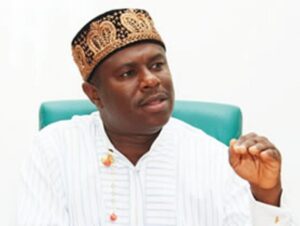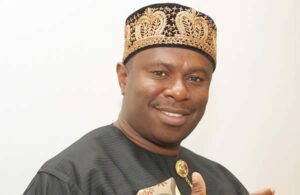
The political dimension of the naira redesign
By Dakuku Peterside
Nigerians are facing the reality of scarcity of cash literarily. Banks are overwhelmed by angry customers demanding money, the ATMs are flooded with furious Nigerians struggling to withdraw cash, and some spend the whole day hoping to get a few Naira notes to pay bills. POS operators complain of a lack of money; a few have charged between 15 per cent and 20 per cent to customers to get some cash. Most Nigerians are stranded because the bank apps for transfers need to be fixed, and most cannot make or receive transferred money. Naira notes are in high demand, and the newly redesigned notes are rare to get unless by a privileged few. There is confusion everywhere, and people are coming to terms with this chaos .
However, the pressure this exerts on Nigeria’s fragile socio-political and economic conditions is enormous and gradually heading to a tipping point. Social media are awash with harrowing videos of people’s reactions in various parts of Nigeria, and they all point to the pervading rage, frustration, and hardship people are going through. All these are happening at a time of heightened political activities near the 2023 general elections, with various permutations, intrigues and strategies of political parties and their candidates to win the voters . Without being the intendment, it is a recipe for upheaval if not checked. The political ramifications of the Naira redesign are evident, but the implications, intended and unintended consequences, are unfolding.
Money and politics are like the Sesame twins. Money enables politics, and politics determine how money is allocated. Money in politics is both a force for good and, at the same time, can be an opposing force. Whenever cash is under any form of threat, politics react. Politics is reacting vehemently, and claims and counterclaims have been made about the Naira redesign’s impact on society, the economy, and politics.
The Buhari administration and the CBN are orchestrating a demonetisation policy that has become the centrepiece of Nigeria’s monetary policy. Although it may seem that this demonetisation policy is a continuation of CBN’s push for a cashless economy driven more by technology than the use of old fiat notes, however, the real meaning is lost in translation, and people need clarification.
Is this a Naira redesign exercise, a cash swap exercise, or a policy for proper currency management, addressing inflation, taming counterfeit notes and cash stockpiled for illegal political activities? Or is it all of these things put together? The problem is that everybody understands and interprets the actions differently, with unclear and dichotomous interpretations of what is happening. The critical question is: did the CBN effectively communicate this policy’s aims, goals, process and intended impact to the people? How did the media frame this policy, and how did Nigerians interpret and make sense of it all? Just as the 2023 general election is around the corner, is this new policy of the CBN politically motivated? These questions merit consideration if we are to understand what is going on and how to tackle the many negative implications before much damage is done.
In recent times, other nations have done some currency redesigns, and we can learn from their experiences. The UK and India have redesigned their currencies lately. But I will use the example of India for obvious reasons that it is closer to Nigeria as a developing nation than the UK. In 2016, Prime Minister Narendra Modi declared that the country’s two highest-denomination currency notes (Rs 1,000 and Rs 500) would be withdrawn immediately from the market. The plan, termed demonetisation by the press, was announced as Modi’s masterstroke against “black money.” As economic experiments go, it was a big, bold move. There was no precedent anywhere in the world for a sudden financial shock of this scale. However, the exercise proved not to be a key determinant of the outcome of Indian elections that year. Unlike the case of India, will this exercise have more significant political implications, some unintended, that are capable of determining the outcome of the elections or truncating our democracy? Let us examine five ways the Naira redesign will affect our politics this year.
First, it will reasonably eliminate vote buying and other forms of financial inducement to the voters, INEC workers or election entreprenuers bent on rigging the election. Some have argued that this policy is a master stroke by the government against vote buying and a blow to the corruption of the electoral process. With the introduction of BVAS and INEC’s resolve to conduct a free and fair election, the window for rigging has become very narrow. Only vote buying is the significant leeway to election rigging. Arguably, some candidates and political parties have stockpiled cash for this purpose. This sudden Naira redesign and swap may have dislodged the use of this stockpiled money to buy votes and bribe INEC officials. Statistics made available by CBN have it that over 80 per cent of the nation’s currency is outside the bank vaults and possibly stored in private vaults by corrupt members of the elite class who are involved in one crime or the other and who wouldn’t be able to defend the source of such huge funds if brought to the bank. Some Nigerians applaud CBN for coming up with such a robust plan at such a strategic season in the country when new leaders are elected. This policy will likely guarantee a bribery-free election by 2023, where voters and agencies would not be offered money to vote a candidate into power.
However, some Nigerians are bemoaning their fate because of the hardship this new Naira design palaver is causing in the country, and they feel that the timing of the implementation is wrong even if the intention is genuine. The real threat is that elections is a major logistics venture that is capital intensive. As a parting gift to most Nigerians, President Buhari, in his wisdom, has decided that the current generation of Nigerians must also suffer the trauma of emergency currency change which the older generation suffered in 1984. His idea then, as it is today, is that it is a method to catch looters of the national treasury who will be forced to reveal their stolen monies. The problem then, as it is today, is that whatever the approach’s merits are, there is massive collateral damage among the masses.
Second, the naira redesign stops the inflow of illicit money used for political purposes, especially proceeds of money laundering and financial crime. Often, cash facilitates illegal and criminal transactions because they are not easy to trace. We know of corrupt government officials stashing cash at home to the tune of billions of Naira because they cannot put it in the bank for fear of being detected. These illicit monies always find its way in the system during elections for different unlawful purposes. Drug dealers and kidnappers struggle to operate within a cashless society. A friend told me that the kidnapping has reduced in the past few days of the cash scarcity in Nigeria. There is a direct correlation between the ease of moving cash and kidnapping and banditry, especially in the North East and South East.
Third, the Naira redesign has strangulated economic activities and added to citizens’ financial pressure. This may cause anger against the government and the ruling party, and at this crucial time of the general election, it may be costly. Economic hardship often leads voters to punish the ruling party and are prone to favouring the opposition. This happened in Greece and Italy. Therefore, experiments in macroeconomic policy are rare, especially in an election year. That it will not help the ruling party electorally is a no-brainer. This policy has split APC in the middle. Some people feel that the policy is made to undermine the APC presidential candidate and his team. Others argue that this policy that has caused coax among people is like an electoral campaign advantage to the opposition, and the APC-led government should have waited until after the elections. The tripartite problem of runaway inflation, economic hardship, and now, the Naira redesign crisis is making selling APC difficult for the party and candidates. The opposition may be having a field day and milking the self-imposed, APC-induced problems almost three weeks before the election.
Fourth, the naira redesign crisis is exacerbating the existing excruciating inflationary trends. This may seem paradoxical given that scarcity of cash should have a deflationary tendency instead of an inflationary one. However, this case is different because of the combination of other inflationary elements within the context of the Nigerian economy. These inflationary tendencies are seen in the high cost of fuel, food, and other necessities, and these forces are so strong that the naira redesign crises have not dented the inflationary trend. Besides, the cash cost is high, which is transferred to the price of goods and services, keeping the inflation on. Inflation at the peak of campaign and elections is definitely not a good mix.
Fifth, the Naira redesign crisis, added to fuel scarcity, and pervasive insecurity, is leading to alienation of the populace which can lead to a rise in anger, frustration, a series of protests and social dislocation. This could threaten public peace and ultimately lead to the abortion of the elections. Some argue that the fifth columnists in the seat of power are orchestrating the crises to truncate the elections and instal an Interim National Government. As preposterous as this may sound, any show of public discontent and opprobrium, especially nearer the election, may make these purported dooms day a reality.
Now is the time to rein the excesses of the Naira crises, deal with both the intended and unintended consequences and give the Nigerian electorate a reasonable chance to vote based on their conscience and elect leaders that will make a difference in their lives.


